This Oka family symposium discussion handed a rare occasion to hear five siblings in their late 80s and early 90s have a candid discussion about their recollections from camp and WWII. While some of what the youngish siblings flashed back was light- hearted play and the aged siblings flashed back husbandry and difficulty, all of them flash back the residual sadness for what their Issei parents must have gone through, despite noway speaking about it. “ pop had it tough. The father of the family, he lost that. Because the family did n’t live presently, ” says Amos Oka, one of the eldest sons.
The family was firstly from a Japanese American husbandry community in San Jose but are now spread out across the country. Flying in from Pennsylvania to Nevada, their return to the Bay Area bookended a dimmed occasion The scattering of their aged family Mary( Shiz) and her hubby Yutaka’s ashes under the Golden Gate Bridge. As the children and grandchildren honored this could be one of the last times the siblings might be together and willing to talk, they commanded this discussion. Mary’s grandson Casey Coe led the questions while Michael Sera of the Japanese American Museum of San Jose helped moderate.
Then’s the list of the Oka siblings:
Lily( Yuriko), is the eldest son and was born on August 31, 1922 in San Francisco, CA.
Mary( Shizuko), was the alternate eldest son and born on June 23rd, 1924 in Loomis, CA
George( Yutaka), the oldest boy, born on August 4th, 1926 in Newcastle, CA.
Amos( Kiyoshi), born on April 20th, 1928 in Florin, CA.
Eva( Masako) Nakano, born on June 12, 1931 in San Francisco, CA.
Jim( Makoto) was born on February 12th, 1933 in Alviso, CA.
Robert( Tadashi) Oka, born on December 3rd, 1934 in San Jose, CA.
Casey Coe Before you went into camp, what was life like before the evacuation?
George: I was fourteen times of age when they came out with the presidential proclamation. I was attending inferior high academy and we went from San Jose to Santa Anita and we were there for about three months until they were suitable to make a further endless camp for us. And in this case we went to Heart Mountain, Wyoming, which is a enough desolate country. I suppose roughly,000 people of Japanese strain were transferred to Heart Mountain. I believe the camp was open for four times, presumably? I was there for close to three times, I believe, and I stayed there until I graduated high academy at which time I felt that maybe before being drafted into the army, I would go out and earn a little spending plutocrat for myself. So I went to Chicago where my father went to work on the road and I went to work in the food assiduity. I worked there for about eight months or close to time before being drafted into theU.S. Army.
CC:( To the youngish siblings) Once you were in camp, was it delightful? Were you apprehensive of the situation?
George: When I went to camp, the big difference between that and San Jose was that our family was decentralized. At home, we were one cohesive unit. But life in camp, our family was spread piecemeal. The children went out to play with other children and the parents had veritably little control over them. The kiddies had their own little group. The parents saw veritably little of their kiddies. Home was just a place to sleep. We lost that cohesiveness as a family. You ’ll presumably hear latterly how they presumably formed a gang or a group of their own. I was a little bit more conservative, I would say.
CC: So, who was in the gang together?
Jim We did n’t have a gang but I had perhaps about five or six people who were my age. I was eight, or nine. So we were n’t too sophisticated, not too strong a gang. But still, we just hung around together and did bad effects.
CC: So Amos, what were those bad effects?
Amos: Everything that went wrong in Block 24, was me. I was the so- called gang leader. The number of effects that happed I knew nothing about it but the block director used to say that I did all these bad effects to my father, and my father believed it. He criticized me for everything. I was fourteen to seventeen.
Eva: Amos was the altitudinous of this group, so they criticized him.
CC: What were some of the frequentness you were criticized for?
Well, to start with, it’s cold wave in Heart Mountain. Minus 28 degrees. So we as teenagers used to go to the boiler room. It was too hard to do effects outdoors. They indicted me – or my gang – climbing up the thing and going over to the women’s room and watching the women’s restroom. And that was one thing I was criticized for. Another thing, I know for a fact that someone used to punch holes. Everything bad that was passing in the block was my fault.
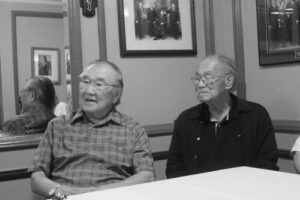
CC: Was there any chance for you to deny that?
Amos: No, my father was a tough joe. At least to me. I had no way of talking back to him. He was the typical Japanese father.
CC: Speaking of your father and parents, what kind of parents were they, both before and after camp?
Eva: They were always working, both of them worked at the mess hall. They did n’t communicate with us. We noway saw them. The boys were in one room and the girls were in the other. Not important caregiving.
Amos: Life was n’t family.
Eva: And also my father went to work for the road, so he left after a while. So my mama was left.
Amos: I left beforehand with my father back to San Jose, formerly they allowed us to go back to the West Coast. My father and I came out and we lived in the San Jose Buddhist Church and slept on the bottom of the Methodist Church.
Michael Sera When you came back to Japantown, was it how you flashed back it?
Eva: You could n’t get a job. “ We do n’t hire Japs ’ and all that kind of stuff.
MS: Indeed in Japantown?
Eva: Yep. We tried to get a job in the cannery. ‘ No Japs hired. ’ Anywhere you tried to find a job.
Amos: hear to this. After I finished high academy and I joined the army, and I was in the army and went to Germany. I came back and wanted to go to Cal Berkeley. So I register and now I’ve to find a place to stay. So you go to the casing department and they give you an address and phone figures. I called the figures and asked, ‘ Do they rent to Japanese American stagers? ’ ‘ No, we ’re Americans then. ’ I could n’t find a place to stay. It was veritably, veritably delicate because they said, ‘ We ’re all Americans then. ’
Eva: veritably prejudice.
Amos: It was an experience.
MS: But you persisted.
Amos: I went to Cal, got a place, ultimately. A lady who had a living room.
Diana Tsuchida Did you ever feel any sense of prejudice before the war?
Eva: Well, we lived on a ranch with other Japanese people. We were sharecropping. Our whole academy, Orchard School on Gish Road, was three- diggings Japanese.
CC: What did you grow on the ranch?
George: Raspberries, cucumbers. I had to wake up at 2 o’clock in the morning to help my father wash the snorts. I was just in grade academy.
CC: So that’s a veritably dramatic difference from your life before camp versus in camp.
George: One thing about it’s that I had to work much harder before camp than in camp. In camp, we noway ate any crops. I had it much easier in my case when I was in camp because ahead, I really had to work my tail off. But in camp I could share in sports. In one aspect, the youngish kiddies at least, had further liberty and in that case, I can say that I had a better life in camp than before camp. This doesn’t apply to my parents or the aged people but in our case, the children, my recollection is that we had it more in camp.
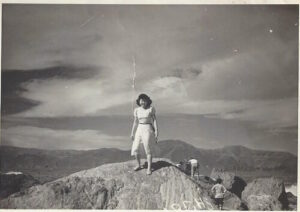
MS: When you were in camp did you work?
Amos: I drove tractors. I worked in a tire shop fixing tires. I did n’t have to work but I wanted some clothes. You got$ 12 a month and so you could buy from the Montgomery Ward or Sears roster.
George: In my case I went out of camp and I went to work picking potatoes. And that was hard work. The way they do it’s you tie a belt and also you got a hook on there and you get a burlap sack also you get a thing with a handle and you picked the potatoes and throw it in your sack. And we got paid by the sack. We worked for three weeks and we made$ 17 bones . Indeed in those days it was n’t too important plutocrat. And the contract that we had was that there were living diggings with running water which sounded real good but what it amounted to was a one room hut with a rustic table and they had a three chairpersons, as I recall. And that handling water was a sluice outdoors, not running water from a hand. It was hard work.
CC: So back in camp itself, what was the food like?
Eva: Yuck-o. I was skinny, I could n’t eat a thing. I used to sneak with my pater to the mess hall and he used to give me all the goodies. It was awful.
Jim A lot of pork chops, I flash back . Always a lot of rice.
Eva: A lot of stew, dry stew.
CC: What was the dining experience was like?
Eva: Never ate as a family, we just ate with your musketeers.
George: It was like the army.
Did they’ve a store where you could buy effects?
Amos: It was a canteen. They would vend smokes, delicacy.
Eva: If you worked there you would get$ 16 a month.
CC: Speaking of difference with stipend, how were you generally treated by people who were contracted to work in the camps?
Eva: ordnance on you all the time. You guys( to the sisters) went out of camp one time, out of the acerbic line. We used to go out there and swim and everything.
George: I suppose they knew we could n’t go veritably far. But we had freedom to go all the way out to Heart Mountain if we wanted.
CC: Did you have to be attended if you went out that far? You just went out there?
Amos: It snows a lot in Heart Mountain so kiddies like to do snow effects. We made sleds out of two by fours. So one day it was nice, there were no hills inside the fended areas but there were a lot of hills outdoors. So we went under the hedge and we were sledding. So there’s a guard palace out there and he sees us doing this thing, calls up headquarters and a whole bunch of guards come with fixed bayonets. Again, as I was the gang leader, the dogfaces marched us all the way to the guardhouse with fixed bayonets on our tails. We stayed in the guardhouse and we missed regale and they called the block director and he’d to pull strings to release us. These two guys know( to Jim and Tad), they were seven times old.
CC: As a seven time old, was that scary for you?
Jim It sure was.
CC: Did they treat you any else after that? Did they single you out?
Amos: Security was enough tight in camp. They ’d sweep the camp with searchlights every night.
Eva: I was in Girl Scouts and they let us out for a week to go to Yellowstone. It was still Heart Mountain so we were suitable to get out with authorization. We were suitable to talk to the people in Cody, Wyoming and we were suitable to write letters.
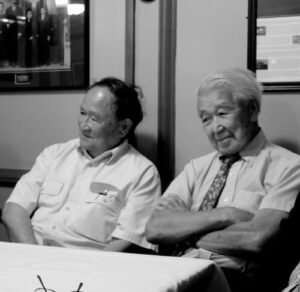
CC: Did any of you ever feel spooked?
Eva: Santa Anita, there was a hoot formerly. We had to run for our lives back to our barracks.
CC: Can you talk more about the conditions there?
Eva: I flash back buses going up and down at night, they had a show of force. It was okay except for the screams.
Amos: When we went there,Mr. Zanker( of Zanker Road) took us. He was musketeers with my father. He took us to the road station in San Jose. We took the train to Santa Anita. When we got there, they gave us sacks. And they said, “ Go over to the parking lot over there and put straw in these sacks. ” That’s our mattress. Another thing I flash back was that we lived in a parking lot but others went to the forces, and my friend was there. nags used to live there and it smelled like hell. I flash back that vividly.
George: It was supposed to be an honor to live with Seabiscuit and Man- o- War. They would vapor about that.( laughs)
Amos: Because of this Korean got beat up, there must have been some conflict with people in the office. And so with this they had colors marching in, with fixed bayonets. And armored buses , twenty four hours a day, with searchlights. And at the post office they had a guard, dogface with a rifle. So all of this made me detest the whole thing and felt they were taking my rights down. I felt old enough to feel that way. All my normalU.S. citizens rights were taken down from me, just for what? Japan went to war with America? I was n’t Japan Japanese. We were Americans. That’s what I really begrudge.
CC: Did the rest of you have analogous sentiments about that?
Eva: Yeah, all three of us.
George: We were too youthful, I suppose. To have that more mature study.
Robert The caucasian people that we knew came to visit us in Santa Anita but they had to speak to us through the acerbic line hedge.
CC: Who were these musketeers from San Jose?
Eva: The Zankers. My pater used to work with Zankers.
George: We lived in the house they possessed, our father used to work pruning their vineyards.
Eva: In camp he transferred us a box of pears.
Amos: So I begrudge the whole thing, and I ’m a nonage in that thinking.
Eva: We had delightful playing. I suppose mama liked it because she was working so hard before the war. She was suitable to do lots of stuff. She was suitable to join groups and do sewing.
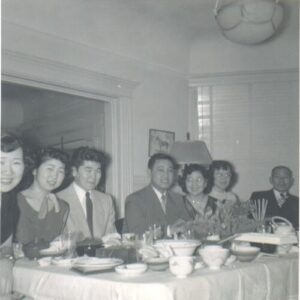
Amos: But pop had it tough. The father of the family, he lost that. Because the family did n’t live presently. I abominated to be him, having to go through all that. And from a cerebral point of view, from a financial point of view, he lost all that work.
Eva: After the war it was bad again because Mom had to work and catch up and cultivate.
CC: Did he ever bandy that with you?
Amos: We did n’t communicate important. I used to communicate with my mama , but not my father.
George: There was to a certain extent, deodorizing circumstances. But it was unjust, no question about that. And the Isseis really suffered. I did n’t suppose the Niseis suffered as important at that particular time.
MS: When the war order came out, what’s the thing you flash back the most?
Eva: Getting relieve of all the bikes and everything we possessed. That was sad.
Amos: My father had lots of tools and my mama just got a washing machine. And my father just got a new auto, he’d just bought a new Ford. And what I call the white trash, they came and they do n’t indeed ask my father if they can look. I suppose my father bought the auto for$ 900 and commodity. They offered for$ 300 for the new auto, he just got it. Washing machine, my mama noway had a washing machine. And again, my folks had no expedient because if they did n’t vend it, what are they going to do with it? I recall that veritably vividly. I abominated it when people just come and go through effects and they can make a ridiculous offer. That kind of thing really got me. I suppose I was prone to this kind of thinking.
CC: It was a constructive time in your life for commodity like this to do.
Amos: I suppose so, I had strong studies about these effects.( To the siblings) important further than you guys, you were too youthful.
MS: You endured all of these effects, but you ’re still a strong American.
Amos: I was educated then, I worked then, what can you do? I’m a strong American.
MS: Other people might have taken a different station or approach. So that’s veritably applaudable.
Amos: I did n’t detest the government, or theU.S. I abominated this situation.
CC: Do you suppose there are assignments to be learned from that time?
George: We just do n’t want it to be again.
Amos: It’s been determined how wrong that was, formerly. It’ll noway be again, I misdoubt it veritably much. I ’m too old for it.
MS: What about your grandkids?
Amos: It’s up to them to fight it, if they believe it.

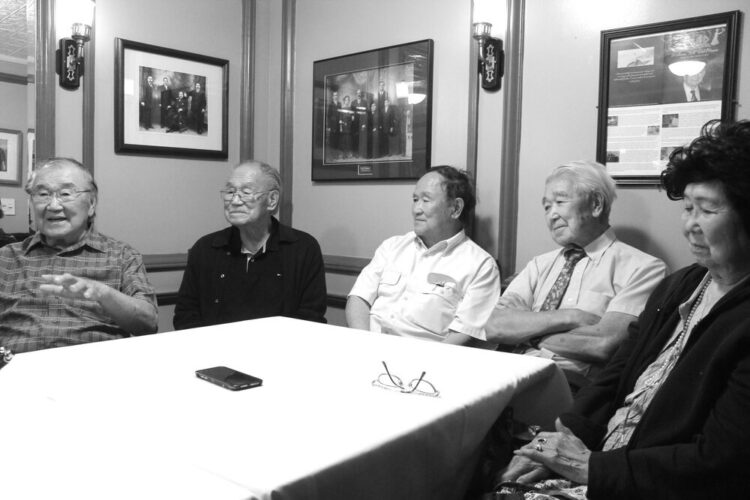


No Comments
Leave Comment